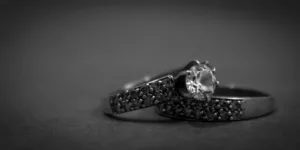A few years ago, my grandmother passed away. My siblings and I received some things as inheritance, including some nice jewelry. Recently, I found out that my sister sold off some of hers, and got a good deal of cash for it!
Nobody in the family is upset about that. These aren’t super meaningful pieces, and none of us are really into jewelry. In fact, neither was my grandmother, so we were all a little surprised to find out this jewelry even existed! So, I’m thinking about following suit, but I’m a little wary of being ripped off. How can I tell what my jewelry is worth? Should I sell it now, or will it only become more valuable over time? How do jewelry values work, anyway? Experts, please help!
Many things factor into the value of a piece of jewelry, say the experts at Luxury Buyers. If you were to sell your diamonds to luxury buyers, they would look at a few different factors to determine what the jewelry was worth.
Those factors include the size and quality of the diamonds and other gemstones, as well as the value of any and all precious metals within the piece. However, it’s not just about raw material. The design and quality of the pieces matter, too. High-end brand names like Tiffany & Co. and Cartier can add to the value of a piece. So can a particularly elegant design, or a design that suits current tastes, meaning there’s a lot of demand. Vintage pieces may be worth more than modern ones in certain circumstances. Again, some designs and brands age better than others.
That’s a lot to consider! Luckily, you don’t have to evaluate all of that yourself. All you need to do is get your pieces appraised.
Appraisal is a pretty easy process, and you can have it done at most jewelers. It’s worth doing for valuable jewelry, even if you’re not planning to sell, because it allows you to get the pieces properly insured.
So, now you know what goes into the value of diamonds and jewelry, and once you get them appraised, you’ll know what yours are worth. But the question remains: should you sell them, or hold onto them?
You may have heard of people investing in gold and other precious metals. There’s an argument that diamonds can be invested in the same way, and there are certainly people who treat jewelry as an investment. They bet not only on the markets for gold, silver, and diamonds, but also on the trends and tastes of jewelry buyers. That may sound unique, but in the world of weird investing, it’s hardly a standout: you can find folks who invest in everything from comic books to waterfowl decoys (yes, really).
However, that’s a complex process, and results can be very mixed. If you’re not into jewelry, you may be better off viewing it as an asset, but not an investment. In other words, your jewelry is valuable and can be sold, but you’re not necessarily going to count on it to appreciate in value. If you don’t have the time or passion for jewelry investing, then you may want to convert your jewelry into cash and put that cash into a savings or investment account, where you grandmother’s gift can grow and help you for many years to come.








